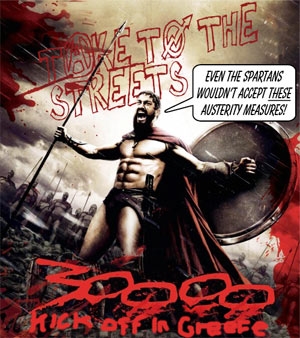Home | Friday 26th February 2010 | Issue 711
GREEK FIRE
GREEK PROTESTS BOOM AS THE ECONOMY BUSTS...
Greece has once again been rocked by protests, strikes and civil unrest. This time in response to a series of swinging government cutbacks aimed at bringing the country into line with neo-liberal dogma and reducing its budget deficit. In response to proposed attacks on workers’ rights and pensions, virtually the entire country came out on strike on Wednesday. 30,000 marched through Athens and violently clashed with police. There is widespread anger at the governments attempts to deal with the economic crisis by dipping into the pockets of the poor. Marchers in Athens shouted, “No sacrifices! Make the rich pay for the crisis!”
This is the second national strike to hit Greece in two weeks. The first, by public sector workers (almost 1 in 5 Greeks fall into this category), grounded flights and shut many state schools and offices. The second general strike was far broader, all flights to and from Greece were cancelled and public transport ground to a near-standstill, with most trains and ferries standing idle. Schools, tax offices and council buildings remained closed. One group of metal-workers in Athens, satisfied that the strike at their own plant was rock-solid, went and blockaded their bosses’ workplace and physically ejected them.
Europe’s four poorest countries, Spain, Portugal, Ireland and Greece, are all facing similar programs designed to restore stability to the Euro. All are being forcefully encouraged by the EU big boys, with IMF backing, to introduce neo-liberal Thatcherite reforms, such as privatisation, raising of the pensionable age and cutting of public services. If Greece wants to stay in the Euro then it has to cut its budget deficit from 12.7% to 3%. These cuts will come at the expense of society’s most marginalised.
The Greek government is headed up by the centre-left party PASOK. They came to power after the previous government was forced out of office during the wave of social unrest precipitated by the shooting of Alexis Grigoropoulos (see SchNEWS 659).
Although Alex’s shooting sparked the rioting, it was fuelled by the economic downturn and the squeeze on Greece’s workers. PASOK’s bid for power was based on promises it couldn’t keep - to win the election they promised no wage freezes and a guaranteed pension. Previously, a government in their situation might just try and print money and inflate their way out of the crisis – not a solution open to Greece’s leaders owing to the country’s membership of the Euro zone.
 |
On top of the national strike, protests hit Athens and Thessaloniki. The 7,000 strongdemonstration in Thessaloniki lasted for a few hours and went off without any clashes with police. Department stores that remained open got targeted by protesters, either by having their walls covered in graffiti or, in the case of cosmetics chain “Hondos Centre”, had rubbish scattered across the department’s shop floor. The protest reached its conclusion outside the ministry with the burning of the EU flag. Only then did Greek police make an appearance, ten of them showing up, but keeping their distance.
In contrast, the protests in Athens were explosive. More than 30,000 took part in two marches, one headed up by the Greek Communist Party. This was described by a SchNEWS eyewitness as ‘boring’. The other consisted of an amalgamation of libertarian communists, trotskyists and anarchists alongside striking workers from the Ministry of Economics. Particularly impressive was the mobilisation of recent immigrants to Greece, who formed their own heavily policed block.
As the second march approached parliament at around 2pm, the police attempted to split it. According to our man on the scene, “It completely kicked off – people were throwing bricks and also bread was looted from a nearby bakers handcart – which was later used as a battering ram against police lines. One thing is clear, people’s hatred of the police hasn’t gone anywhere since December.”A few molotovs were thrown and violence continued sporadically throughout the day, with anarchists attacking banks.
The majority of protesters were disgruntled workers from the country’s two largest trade unions. A faction of young protesters entered a university building. Riot police followed, even though under article 16 of the Greek constitution, no police forces are allowed to enter university grounds. They withdrew to outside the gates soon after and dealt with the youths by firing tear gas. Further clashes followed, with police firing tear gas at protesters as the march made their way through the Athens streets. Greek newspapers reported that police arrested around 30 people during the protest and 23 police officers were hospitalised.
At the moment, neither side is backing down. The government claims it is going to push forward with the cutbacks, while workers’ organisations have vowed another general strike on March 15.
With Spanish trade unions also gearing up for a general strike and large scale protests in response to similar proposals for cutbacks - it looks as if the neo-liberal Europe proposed in the Lisbon Treaty might be in serious crisis.


